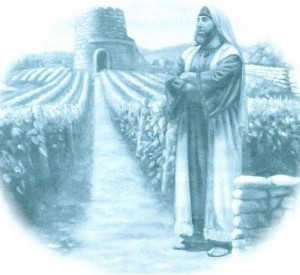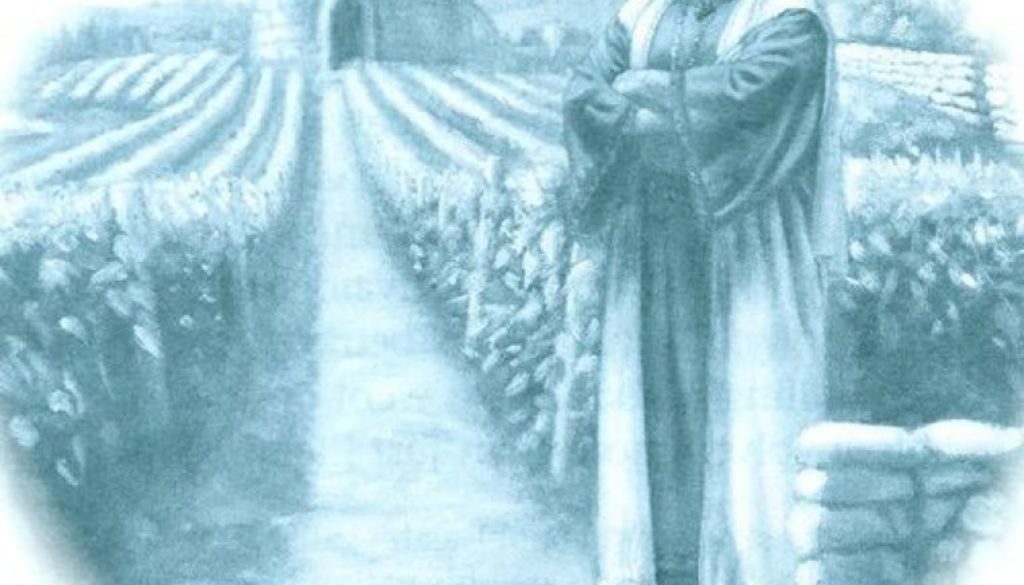Matthew 21:33-46 The Wicked Tenants

We are continuing on with Jesus in the temple in Jerusalem. He is still addressing the chief priests who came to challenge His authority. Are you ready for round three? I think we all know who is going to win this one too.
Jesus uses another parable today in His battle. This one is about a landowner and his tenants. Jesus’ story starts out with the master of the house making preparations. The master didn’t simply lease out a piece of land and wait and see what the tenant would do with it, but he cultivated and tended a vineyard until it was productive. He dug ditches around the vineyard to create an irrigation system and a barrier to predators. He built a watchtower to protect it from any enemies. This was a carefully tended and established piece of property. A lot of planning and care went into making this vineyard profitable.
When the owner had everything ready, he leased it to tenants. The agreement included the tenants tending the vineyard and paying for their “rent” by giving back to the master of the house a portion of the harvest. The tenants also received a portion of the crop for their labor, but first the master of the house had to be paid.
While the master was busy in another country, he didn’t forget about the vineyard. He simply trusted his tenants to be caring for his property and to honor their agreement. The master of the house didn’t need the tenants to tell him the harvest was ready. The master of the house knew the seasons of the vineyard well. He had been working this vineyard from its infancy. When the time was right, the master of the house sent to collect his payment in fruit.
The master hasn’t been micro managing the tenants. He has trusted them explicitly with his property. The tenants have been very successful in caring for the vineyard. They are overjoyed with the crop the vineyard has produced. They are so pleased with it that they want to keep it all! After all, it was only produced through their hard work.
One day three of the master’s servants arrive on the doorstep of the main house in the vineyard. They have come to collect what is due the master. The master knew the capabilities of the vineyard and he expected to receive an abundant harvest. That is why he sent three men instead of one. The servants have come with carts to carry the master’s portion away to his wine steward.
As soon as one of the tenants open the door to the master’s servants he realizes what these men are here for and what they represent. “How dare the master try and take our crops. We worked long and hard for this harvest. We’re not sharing it with anybody”, reasons the tenant at the door. He can’t say this to the servants though. They would go away and tell the master and he might try and take the vineyard away from them.
Our lone tenant invites the servants in for some breakfast while he goes to gather his fellow tenants. “Three men showed up on my doorstep this morning saying they came from the master of the house. They brought horses and carts to collect the harvest. If he thinks he is just going to walk in here and take everything we have worked so hard for, he has another think coming. This crop is too valuable to simply hand off to someone else. What we need to do is make these guys disappear. He is probably too busy with his other affairs to even notice that the servants didn’t come back. You know how unreliable servants can be.”
“What do you suggest we do?”
“They are in my house enjoying my ‘hospitality’ right now. We need to split them up and then we can deal with them more easily. We will team up in groups of three. Each group will take one of the men into a different corner of the vineyard. Once we are away from prying eyes, we will kill them. I don’t care how you do it. Just make sure they can’t get back to the landowner and report on our crop.
The group of tenants head over to the home where the servants are waiting. Each servant is invited to join a group to survey the vineyard. The servants willingly go with the tenants. The tenants put their plan in motion. One man is stoned to death. The second one is beaten badly but manages to escape. The third one is run through with pruning shears. The tenants are a little discouraged that one got away, but maybe it’s best this way. He will go back and tell the master how dangerous these men are and they will be left alone.
The one surviving servant reports to the master what has occurred. The master is angry but thinks there must be some explanation for this behavior. He has acted in good faith. Maybe they tenants just need a stronger reminder of who’s property they are occupying and who’s harvest they are holding. The master decides to send another delegation of servants to collect his harvest. This time he sends out five servants. He also warns the servants of the last encounter.
One of the tenants is in town the day the second group of servants arrives in the area. He recognizes the master’s seal on the carts being brought in. He quickly gathers his fellow tenants and they hatch a new plan. There are more servants this time and they are sure to have been warned. They won’t be tricked so easily. It is decided that they will ambush the servants in the olive grove near the vineyard. Those ambushing the servants will disguise themselves to make it look like common robbers committed this act.
Men are positioned in the trees and a few near the gate of the vineyard. The ones near the gate are to greet the servants and encourage them to come closer. As the group of servants draw near they see two men at the entrance of the vineyard who appear to be working on the ditch. The servants are cautious in their approach, because of the stories of what happened to the last group, but nothing looks amiss so far. Greetings are called out between the approaching group and the men at the gate. The servants feel buoyed by the friendly tone and continue onward, right through the olive grove. As soon as they are fully under the trees, stones begin to rain down on them. Men jump from the trees and start pummeling them. Pruning shears slash out. The screams of the servants are muffled by the surrounding hills as their bodies succumb to the onslaught of the tenants.
In the chaos, one servant escapes. He is in bad shape but at least he is alive and can report back to the master what happened. Four men’s bodies lay on the ground lifeless. A couple of horses were injured in the ambush and one of the tenants was wounded, but he will heal in no time.
The one surviving servant returns to the master. He reports what took place. The master is enraged at the report. The servant informs him that the ambushing group could have been ordinary robbers and they were just unlucky enough to be taken at that point. The master decides it is time to send a stronger message to the tenants. He will send his son with complete authority to assess and deal with the situation. Surely the tenants will respect his son. The master would love to go himself but he has pressing business here that he must tend to.
The master’s son arrives in town. He is kind to the town’s people and openly discloses his intent to visit the tenants. He assures them that his father is fair and if there is some other explanation for the events that took place with the two groups of servants, he is willing to listen. One of the tenants overhears the son conversing with the local merchant. He quickly runs back to the vineyard to tell the others who he has seen in town. “This is our chance boys! This is the heir! If we get rid of him there will be no one to inherit the vineyard. When the master dies it will come to us. If the son dies maybe the master won’t even want the vineyard. But we have to make it look like someone else killed him. If the master finds out it was us, we will have no hope of inheriting.”
Several hours of plotting take place and it is decided that they will invite the son to the vineyard and kill him there, but they will place his body in an area known to be frequented by bandits. They will make it look like the bandits killed him.
Word is sent to the son that the tenants want to meet with him. They have the messenger assure the son that they were not responsible for the previous deaths, so he has nothing to fear from them. They invite the son to come taste the wine that has been made from the grapes. They also promise that they will personally deliver the master’s portion to him when he comes.
The son arrives at the vineyard alone. He has stationed two servants on a nearby road. They are to keep watch and be prepared to summon help if the need arises. The son believes, like the father, that they will respect the authority the son caries in the name of the father and that no harm will befall him.
The tenants take the son to the tasting room. As soon as the door is closed the tenants seize the son. They rip the robe from his back and begin beating him. They continue beating him with their fists, clubs, and whips until he lies lifeless on the ground. This beating lasted about an hour. The servants waiting nearby thought they heard raised voices but were not sure if it was in celebration. They respect the son’s command to let him deal with the tenants.
All is quiet now, until one of the tenants steps out of the tasting room. He has blood all over his tunic! The tenant quickly grabs a wheelbarrow and brings it into the room he just exited. The servants have come to full attention. What is going on? Moments later, the wheelbarrow emerges, bearing a body that looks so badly broken that it is almost unrecognizable as human. Quickly it is wheeled to the edge of the vineyard, across a small path and into a nearby thicket. The servants follow while still keeping hidden. The body is dropped into the brush and the tenants quickly retreat back into the vineyard. The tenants don’t notice the servants hiding nearby.
As soon as the tenants are out of sight, the servants approach the discarded body. The body is so badly beaten that it is barely recognizable, but the master’s signet ring is still on the mangled hand of the son. There is no doubt. The son is dead and the tenants were the ones who killed him. One servant stays with the body while the other goes for help. They weren’t able to prevent the son’s death, but at least they can care for his body.
Word has reached the master as to the actions of the tenants. He is beside himself. How could he have been so blind as to the true nature of the tenants? There WILL be consequences for their actions. This behavior will not go unpunished. The consequences for such an act is death and he intends to see it meted out.
Jesus questioned the chief priests about this parable. They knew the appropriate consequences for the behavior of the tenants. They also recognized that they were being referred to as the tenants. Israel’s religious leaders had a long history of the despicable treatment of God’s prophets. This history included their behavior towards John the Baptist, which Jesus had just previously pointed out.
Jesus says that the Son’s death is the cornerstone for the new promise. This cornerstone is the foundational truth of Jesus’ deity and His saving work on the cross. That is the foundation on which Jesus builds His church. Israel’s religious leaders are about to have the Kingdom of God ripped from their hands. They were entrusted with the law but have led the people astray at every opportunity. Jesus is giving the promise to a new people. Those who believe the foundational principals of His life.
Jesus’ words about “those who fall on this stone will be broken to pieces; and when it falls on anyone it will crush them” are difficult for me to understand fully. I have been Googling this verse and have been presented with two different answers. The bible commentary answer is that “falling on the rock” happens when one rejects Jesus in the here and now; whereas being “crushed by the rock” represents eternal punishment. The second answer comes from a commentary thread composed of many different people and states that “falling on the rock” is the believer being broken and coming to repentance so they can begin building their repaired life (through His healing) on the rock; whereas one being “crushed by the rock” is when someone utterly rejects Jesus to the end. They become like chaff and are blown away by the wind. They have made their place apart from Jesus. I rather prefer the second interpretation myself.
Whichever answer you ascribe to, the chief priests knew Jesus was ultimately talking about them, and they did NOT like His message. They wanted Him dead! But they were too afraid of the people to move on Jesus right now. This was too public a venue. The people believed Jesus was a profit and if the chief priests had acted on their own desires, the people would have revolted. They were being pushed into a corner by Jesus’ bold words, but they had to take it for a little longer. I can almost hear them saying, “We’ll get You soon enough” as they wring their hands right now.
Lord Jesus, You were done being gentle with this group. Time was short and they were going to hear what they had chosen as their fate. They alone made the decision damming them to be crushed by the cornerstone. They could have followed Nicodemus’ example, but they didn’t. They chose to continue to play the role God had foreseen. Not because God trapped them into this role and they had no way out, but because He had already seen what was to come and who would be involved in it.
Thank You Lord for laying the Cornerstone that You let me build upon. I can’t build alone and I can’t build at all until I have been formed into material matching Your specifications. I must be broken and remade. Then together with Your help, I can be built into what You have designed for me. Thank You for the breaking and not a crushing. Bring me back to the rock each time I need to do a little re-breaking. Like bringing clay back to the table for “burping” to remove the impurities. Thank You for caring so much about the finished product that You put YEARS into the actual construction process. Thank You that You never gave up on me; even when I messed up Your designs. You patiently bring me back and rework the pieces I have spoiled. I have no idea what the finished product will be, but I pray I will be useful and bring You honor in whatever it is You create from my life.




June 15, 2016 @ 1:40 PM
Like you, I also prefer to be broken (and when necessary re-broken) upon the Rock rather than to be crushed by it.
I have fallen behind in my reading, here. But I still love what you present each day.
June 15, 2016 @ 3:29 PM
I was beginning to feel lonely. Thank you for commenting.
I don’t know how many times I have been broken and rebroken! Nor how many remain until I finally meet Him face to face. So long as I DO NOT get crushed, I don’t mind how often it has to happen. I only wish I would stop making the mistakes that bring me to the breaking place. Or at least stop repeating the same ones over and over again.
June 16, 2016 @ 1:13 PM
I hear that! I too, seem to stumble over the same pebble time and time, again.